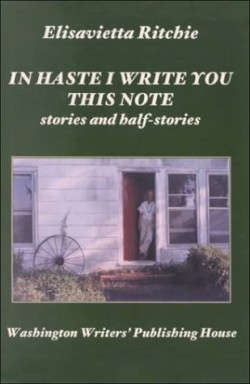In Haste I Write You This Note
Stories and Half-Stories
Ritchie’s resonant writing evokes humanity’s most endearing traits. Whether showcasing American diplomats, struggling fishermen or worried parents, her work will remind readers of the many serendipitous connections and missed opportunities that continually swirl in the world around them. Three of the four sections in this twenty-one story collection are composed of interwoven tales, each of which can stand alone. In Haste is Ritchie’s twelfth book.
The first story, “The Lady in Eight,” is a four-part narrative about romantic encounters. Its opening piece, “In Haste I Write You This Note,” presents a woman’s internal rumblings as she weighs the pros and cons of inviting a neighbor to her home. Her obsessive search for the right words—how does one invite a male acquaintance to one’s apartment?—is poignant, wrenching. Three other vignettes round out this section. The man’s perspective and observations about the meeting and ensuing flirtation are offered; likewise, readers will feel desires both painful and primal as they grapple with the longing the female presents.
The second series of stories, “Communications from Paradise,” assess the ways individuals utilize psychological denial. Some literally deny all unpleasantness, whether a poisonous snake or an unfaithful mate. Others, like the protagonist in “The Big Sixtieth,” confront misery head-on, bravely struggling to make sense of a best friend’s unexpected death.
Section three, “Marching On,” addresses relationships and the ties that both bind and strangle. “Marching to War,” one of the most moving stories in the anthology, is written in the voice of a woman whose only daughter has enlisted in the military. The mother, a single-parent, has been too busy raising her brood and working to actively protest violence. Now, she worries
that her lack of political engagement has unwittingly caused her child to accept armed conflict as inevitable. The ten other pieces in this section are equally compelling. Domestic violence, human/animal communications, poverty and divorce, all are treated with freshness—an emotional clarity—that startles.
Similarly, “Re-Inventing the Archives,” exudes honesty and integrity. In this tale, an adult daughter attempts to decipher which family legacies to keep and which to discard. It is riveting material.
Ritchie writes with a poet’s finesse, a psychologists’ insight and a sage’s humanism. It is a brilliant mix, rare, heartfelt and wise.
Reviewed by
Eleanor J. Bader
Disclosure: This article is not an endorsement, but a review. The publisher of this book provided free copies of the book to have their book reviewed by a professional reviewer. No fee was paid by the publisher for this review. Foreword Reviews only recommends books that we love. Foreword Magazine, Inc. is disclosing this in accordance with the Federal Trade Commission’s 16 CFR, Part 255.

